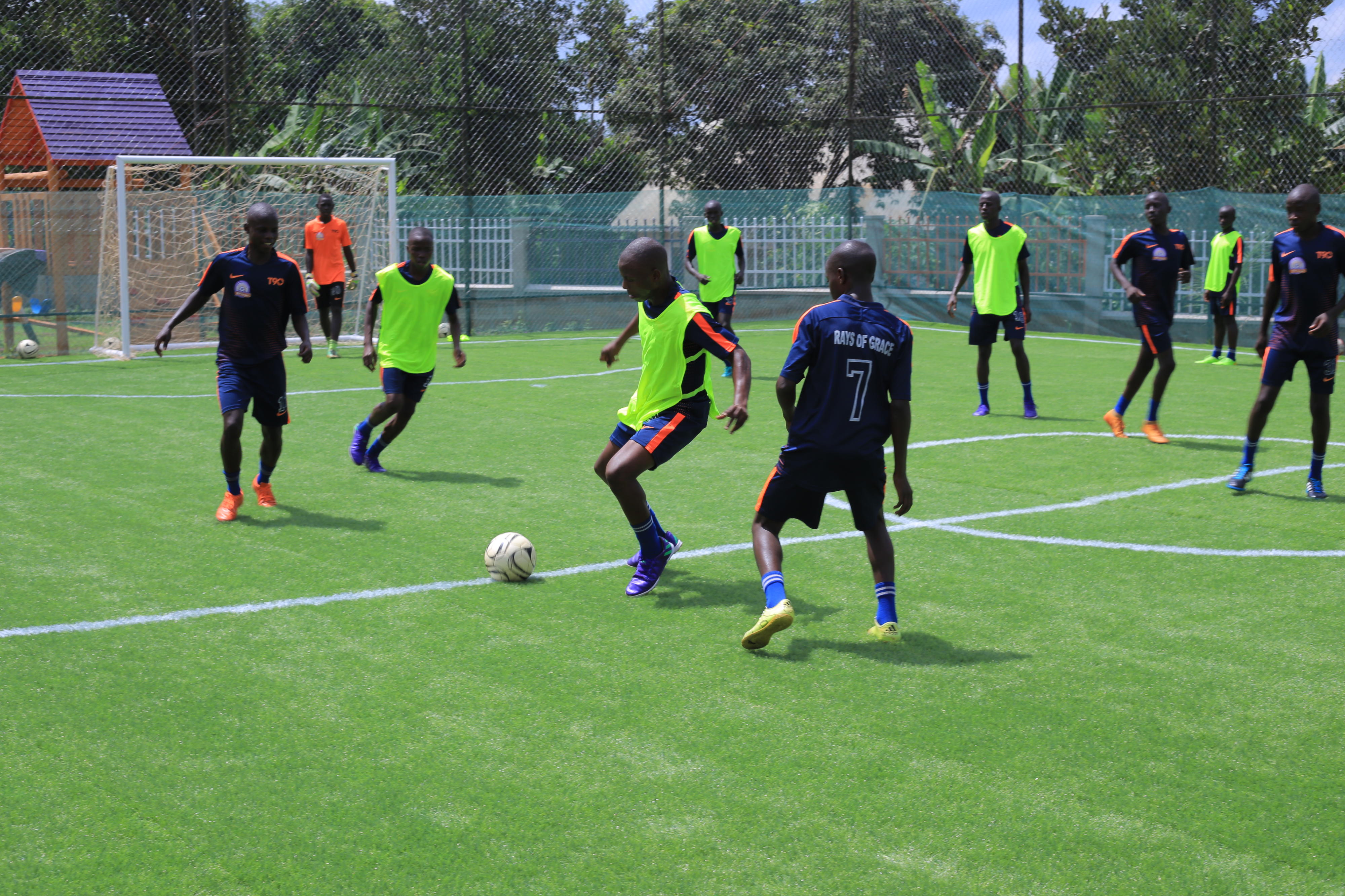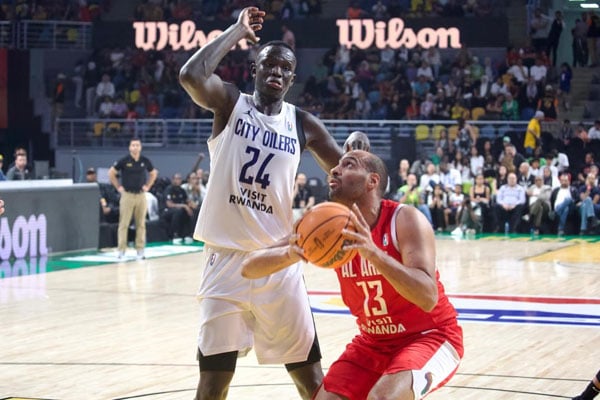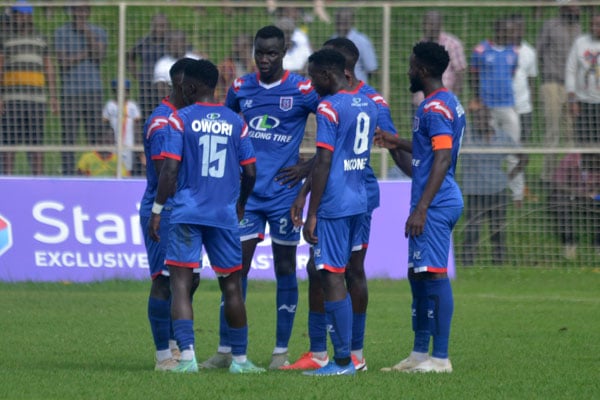Kiwanuka’s dream is to make youth football safe

Beautiful Game. Rays of Grace Football Academy players partake in a match simulation session at their ground earlier this year. PHOTO / GEORGE KATONGOLE
What you need to know:
- Catching Them Young. Aged 34, Roberts Kiwanuka is the chairman of the Uganda Youth Football Association (UYFA). He is also the proprietor of Rays of Grace Junior School in Njeru and the Executive Director of the Hoffman Foundation, an organisation that deals with community empowerment dealing with single mothers and doing microcredit finance and financial literacy while supporting their children through school. The foundation, which operates in five districts of Mukono, Kampala, Nakaseke, Buikwe and Wakiso, was started in 2014.
During his youthful days, he played with Masaka SS and Kabale-Ssanje in Kyotera in the Copa Coca-Cola Schools championship. Being multi-talented, he took part in drama with Tender Talents Primary School and Makerere University in the Department of Music, Dance and Drama where he completed a diploma in MDD. He went on to pursue a degree in statistics and post-graduate diploma in organisational management and development. He is a certified football administator with FAMACO I. He is interested in supporting less privileged children playing football. He started Rays of Grace Academy to empower young football players into professional players.
How do you count your success with Rays of Grace Academy?
The academy project started as early as 2015 when I was still initiating the school project. When I was starting the school, I wanted to use football as an opportunity for the less privileged children to get education. The first priority was looking at opportunities of developing these children through the school set up. This would work two ways – by them supporting the school to become powerful while we give them an opportunity for exposure. The objective was to prepare players for secondary school scholarships. On this front, we have achieved a lot because we have players in Jinja SS, Bishop’s SS Mukono, Buddo SS and St Mary’s SS Kitende have approached us because they want as many players as possible. Our first success was through the U15 Championship that was in Mityana in 2018. In the same year we ventured into the Airtel Rising Stars that was held in Masaka. We won that trophy on our debut and we still went on to win the following year in Luweero. We have a couple of trophies with our junior team.
At the national level, we have produced players that have gone to the underage categories especially the U15 and U17. We have Vincent Mulema, Leonard Kasaanya and Travis Mutyaba on the U15 national team while in the U20 in 2019 and 2020, we had five players such as Enock Luyima, Mulema, Peter Gava, Christopher Nyongesa and goalkeeper Dan Kirumira.
This seems to have happened in a very short time. How did you manage it?
Having players at the national team is not a joke. You have to work hard and keeping them consistently on the team is one of the basics we have achieved in the area of skills development.

Eagle-Eyed. Kiwanuka wants young footballers to follow the right path and achieve pro status. PHOTO/GEORGE KATONGOLE
We have a masterplan and one of our visions and dreams was how to achieve in terms of infrastructure. We have a natural grass pitch that we are improving and it is the one the Elite League used for the playoffs. We also lent it out to the national team. We also have an artificial turf which is used for player development. However, we are building dressing rooms and we have plans to put up stands to be able to accommodate a pavilion. We also have plans to establish another small-sided pitch for 9-a-side football. This is in line with the development stages at the team. We are on a journey to produce players that are ready for the international market. We hope by December 2022 to have at least the stand at our main pitch and the 9-a-side pitch ready. Our initial strategy was December 2020 but we pushed it because since Covid-19 broke out, there is no business going on in the country. When business relaxes a little bit, we are optimistic of achieving that objective.
You are only talking about boys’ football. Why the bias?
Managing a girls’ team is very risky. That is a delicate sex to deal with more especially on the side of our institution. It does not mean that we are biased on girls but there is so much that needs to be invested in that area. First of all the quality of coaches must be very good while the caretakers should also be well monitored. However, this year when schools had opened, we had started to train girls below the age of nine. They had been embedded in the development programmes of the school. We did not want to scout but we had wanted to encourage parents to have these children play within the school. We still have fears on how to manage. There is so much we need to understand on managing a girls’ team.
As a leader of youth football, how do you balance this because everyone has similar fears?
There are numerous programmes that are trying to balance the two managing girls and boys. This is a big challenge on my side because as a leader I need to introduce one on the U12 level. Beyond that, adolescent girls become problematic. My institution is a school and we cannot have players possibly beyond 12 years. Girls need extra care and management but as a leader I have tried to encourage most academies like Isra, Kawempe Muslim, and Tooro Queens, among others to continue with girls’ football. For me, I am still in development and in our structures we go step by step. We have all age groups from U12 to U17 and in our setup we are building a club that can absorb players above U18 so that we prepare them for professional engagements before they get clubs. In the near future, we can achieve the same for the girls.
What is your plan for girls’ football?
We have set up a girls’ football committee under the Uganda Youth Football Association (UYFA) supposed to develop girls’ football at the U17 level. In all regions, we have set up a committee for that purpose to help start a regional league. We are writing up a concept that will see us hold a girls’ clinic in every region. Those regional tournaments are going to be part of my youth agenda.
On the first attempt you were elected the chairman of the Uganda Youth Football.
How easy was that?
It wasn’t as easy because people need to receive you. The reception was not easy because many people thought bringing somebody new into football leadership was bad. I don’t know how people judge new but I have had people on social media discussing me as a new person in football but football needs brains. The number of years does not mean you understand the dynamics of football development. I did great study about football before I came in and my professional training prepared me well for this. I have also had an academy where I have put up a standard countrywide. It does not just come. There should be training, structures that can uphold those ambitions.
Management in football is diverse and there are dynamics of management. Former footballers have ventured into refereeing or coaching. I know for sure that every club needs a governance structure. One of the things I want to work on under my leadership is governance. From there I will embark on football standards and then we go into business. How to develop players that can be sold is an agenda for all football administrators. It does not mean training players only but also leadership.
Basically, I inherited an association that was very unpopular but it now has a new face and people have now started talking about it. We are being accountable by listing qualified academies.
What is your philosophy in successful management of youth football?
The leadership of Fufa has gone down by giving many people platforms to study what they can do better. Football has gone into the direction of professionalism where somebody in marketing does not need to be a player on the pitch. In my philosophy, I want to have inclusive governance. That is where Eng Moses Magogo wants to score. He wants to make sure that every young person in the country kicks the ball. One of the strategies to achieve this objective is to empower youth football and its leadership. We want to make sure that the girls play football. We can achieve this through district and regional leadership. We want to have development officers at regions and youth leaders with expectations and targets.
There were cries about some academies being left out. The most notable was Uganda Youth Soccer Academy (UYSA), who claimed they were being persecuted and excluded. How do you handle such cases?
I have tried to avoid talking about individual academies because an association is for everyone and it gives an opportunity to all those that qualify to be registered. The most important thing is what should an academy do to become a member of UYFA? As long as these academies fulfil basic requirements, it is automatic to be registered. Those that have queries, we normally guide them and advise them on the changes they must make. In the case of UYSA, he [Academy Director Ivan Kakembo] was advised on what to do. He just needs to work on it.
So, what qualifies an academy?
One of them is the governance structure. You cannot be the coach and the chairman, treasurer, licencing officer or CEO. An academy should not be in someone’s pockets. We want to create leadership where academies stay longer not for individual benefits. At my academy, for instance, you won’t find me taking all the decisions. I don’t handle the academy day-to-day operations yet the academy is moving whether I am around or not. They should also have a training pitch which can be a school, church or community. In this case they can make a memorandum. You must have an office that keeps your equipment and records especially on the development of players. Not all academies can operate at the same standard. There are levels. But you need an MOU with an institution that has a pitch in case you don’t have one.
How are you empowering the academies to achieve that status?
We charge them Shs200,000 for registration. I don’t think that is expensive. We have regional coordinators who are mandated to support academies through the process. We have partially registered some even without all the requirements. The process could be complex but under my leadership, I want to simplify such that we limit movements and carry numerous documents. In the system we are building, we shall have an online registration system. That will change the dynamics of academy registration and make it cost effective. The system is incomplete but at least the forms are online even though the format of submission requires one to move to the head offices.
So, why would an academy strive to become a member of UYFA?
One of things people need to understand is why they should register. One, we are going to give you a connection to Fufa Connect where you can keep your players for protection. This can solve issues of player theft with Premier League Clubs such that the academy owners can gain training compensation when their players are sold. We are fed up with that fracas of fighting for players. The Fufa Connect system protects players for future reference when the player becomes successful in future. We are soon coming out with a policy on domestic compensation because clubs locally don’t want to compensate academies that have struggled with these players. So, when you register with us you have that safety.
Registered clubs are also sure of the child protection policy. Some children are being sexually harassed by different people when they actually don’t know what they are going through. Fifa’s mandate is to make the game enjoyable by everyone. So, when children are harassed, their access to a better future is affected. However, we are not everywhere. They will be those cases but we want to make sure that we minimise cases of child abuse in football. No one would wish their children to be abused while still young because they will be traumatised and they will end up running out of the game.
Very soon we will come up with access to other benefits like free playing equipment.
Player sagas at the lower levels have been with us, how confident are you that your leadership can offer an everlasting solution?
When you have a centralised player database, there is no way those confusions can come into place. The moment the player database is emphasised and the Fufa Connect system is upgraded, then those areas of concern will be addressed. Fufa had age-cheating problems but with a database, you can easily monitor players. However, I cannot say that all the problems of youth football are going to be solved by my leadership. When we centralise the data, you find out that even guardians that have issues, their details will be captured.
How should academies be compensated?
We are coming up with a symposium when the lockdown is lifted to consult on the policy for academy compensation and we set up a figure. We shall consult academy owners to come up with a consensus that we can present to Fufa.
We had two lost years. Youth football was last active in 2019 when we last had the major events such as Copa Coca-Cola and Airtel Rising Stars. How do we move from here?
We are not yet sure because the determinant factor is the level of vaccination. That is why we would encourage all youth managers to get vaccinated. When we vaccinate, we reduce the risks that are involved in virus transfer. In Europe, the fans are returning and this has been achieved by vaccination. But if we could have the nature of programmes that Fufa is holding by calling youth teams to come and play, we can move on.
A lot of emphasis has been placed on secondary football with the U14 tournaments such as City Tyres dying away.
Recently, Fufa introduced the Odilo Schools Championship which was absorbing most of the players in the U14 category. We have the U15 Uganda Youth Football Championship. We have the regional leagues for U17 that Fufa has introduced to reduce transport costs and increase player recruitment.
Our main objective now is to introduce the U13 category which can absorb the upcoming players.
We want to partner with the futsal association and beach soccer to improve on the tournaments such that those that cannot play in national championships can be absorbed in futsal and beach soccer.
You have laid ambitious plans, do you think they are going to be achieved in this term?
Some are short term while others are long term objectives. For those that we won’t achieve in the current four years, we shall push them to another leadership. If I remain the youth chairman, then I will pick it from there.
Personally, I would not want to take more than two terms in office for progression. The first term helps you to understand the diversity of academy leadership. If you do well, and there are greater opportunities and we need to finish a few things, then we will work with the leadership to push on to the next level.
What will you count as success in your term of office?
Decentralising academy activities. This will mean increasing the number of children playing football. If I achieve that and empowerment of regional leaders, I would count myself successful. I want to see more regional competitions in order to provide players a platform.
Secondly, if we get the central data system, we should be able to know the number of children playing football in Uganda.
QUALITIES OF AN ACADEMY
Governance. You cannot be the coach and the chairman, treasurer, licencing officer or CEO. An academy should not be in someone’s pockets.
We want to create leadership where academies stay longer not for individual benefits.
At my academy, for instance, you won’t find me taking all the decisions. I don’t handle the academy day-to-day operations yet the academy is moving whether I am around or not.
They should also have a training pitch which can be a school, church or community. In this case they can make a memorandum. You must have an office that keeps your equipment and records especially on the development of players.
Not all academies can operate at the same standard. There are levels. But you need an MOU with an institution that has a pitch in case you don’t have one.




